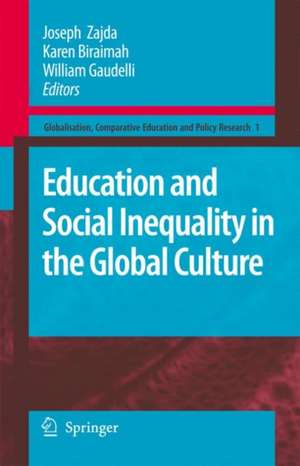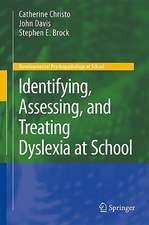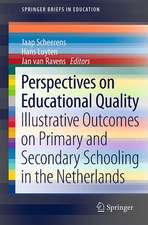Education and Social Inequality in the Global Culture: Globalisation, Comparative Education and Policy Research, cartea 1
Editat de Joseph Zajda, Karen Biraimah, William Gaudellien Limba Engleză Hardback – apr 2008
| Toate formatele și edițiile | Preț | Express |
|---|---|---|
| Paperback (1) | 637.59 lei 6-8 săpt. | |
| SPRINGER NETHERLANDS – 19 noi 2010 | 637.59 lei 6-8 săpt. | |
| Hardback (1) | 643.84 lei 6-8 săpt. | |
| SPRINGER NETHERLANDS – apr 2008 | 643.84 lei 6-8 săpt. |
Din seria Globalisation, Comparative Education and Policy Research
- 24%
 Preț: 731.72 lei
Preț: 731.72 lei - 20%
 Preț: 753.43 lei
Preț: 753.43 lei - 18%
 Preț: 727.66 lei
Preț: 727.66 lei - 15%
 Preț: 636.63 lei
Preț: 636.63 lei - 15%
 Preț: 636.80 lei
Preț: 636.80 lei - 15%
 Preț: 637.28 lei
Preț: 637.28 lei - 15%
 Preț: 642.83 lei
Preț: 642.83 lei -
 Preț: 389.11 lei
Preț: 389.11 lei - 15%
 Preț: 643.00 lei
Preț: 643.00 lei - 15%
 Preț: 583.45 lei
Preț: 583.45 lei - 15%
 Preț: 646.62 lei
Preț: 646.62 lei - 24%
 Preț: 694.98 lei
Preț: 694.98 lei - 18%
 Preț: 731.59 lei
Preț: 731.59 lei - 15%
 Preț: 644.82 lei
Preț: 644.82 lei - 18%
 Preț: 939.77 lei
Preț: 939.77 lei - 15%
 Preț: 635.31 lei
Preț: 635.31 lei - 18%
 Preț: 941.82 lei
Preț: 941.82 lei - 18%
 Preț: 994.39 lei
Preț: 994.39 lei - 18%
 Preț: 724.80 lei
Preț: 724.80 lei - 18%
 Preț: 886.43 lei
Preț: 886.43 lei - 18%
 Preț: 887.86 lei
Preț: 887.86 lei - 18%
 Preț: 777.35 lei
Preț: 777.35 lei - 15%
 Preț: 642.51 lei
Preț: 642.51 lei - 18%
 Preț: 781.45 lei
Preț: 781.45 lei - 18%
 Preț: 775.65 lei
Preț: 775.65 lei - 18%
 Preț: 938.66 lei
Preț: 938.66 lei
Preț: 643.84 lei
Preț vechi: 757.46 lei
-15% Nou
Puncte Express: 966
Preț estimativ în valută:
123.24€ • 133.91$ • 103.59£
123.24€ • 133.91$ • 103.59£
Carte tipărită la comandă
Livrare economică 21 aprilie-05 mai
Preluare comenzi: 021 569.72.76
Specificații
ISBN-13: 9781402069260
ISBN-10: 140206926X
Pagini: 240
Ilustrații: XXVIII, 212 p.
Dimensiuni: 155 x 235 x 23 mm
Greutate: 0.51 kg
Ediția:2008
Editura: SPRINGER NETHERLANDS
Colecția Springer
Seria Globalisation, Comparative Education and Policy Research
Locul publicării:Dordrecht, Netherlands
ISBN-10: 140206926X
Pagini: 240
Ilustrații: XXVIII, 212 p.
Dimensiuni: 155 x 235 x 23 mm
Greutate: 0.51 kg
Ediția:2008
Editura: SPRINGER NETHERLANDS
Colecția Springer
Seria Globalisation, Comparative Education and Policy Research
Locul publicării:Dordrecht, Netherlands
Public țintă
ResearchCuprins
Global Convergence and Divergence in Childhood Ideologies and the Marginalization of Children.- Measuring Inequities in Secondary School Attendance: The Probability of Attending Secondary School for Primary School Graduates in Nicaragua.- Religion, International Aid, and Used Clothing: Globalization and Mayan Literacy Revival in Guatemala.- A New Understanding of Globalization: The Case of the Romà.- Equity Considerations in the Access to Higher Education in Central and Eastern Europe.- The Process of Inclusion/Exclusion in Brazilian Schools: Data from Reality.- Private Resources in Educational Finance and Equality Implications: Evidence from Peru.- Defying the Odds: A Study of Grade 11 Female Students in Eritrea.- Voices of Teachers in Academic and Vocational Secondary Schools in Egypt: Perceived Consequences of Educational Reform for Quality and Equality.- Cultural Capital: What Does It Offer Students? A Cross-National Analysis.- The Institutionalization of Mass Schooling as Marginalization or Opportunity in Islamic Nation-States.
Recenzii
From the reviews:
“The volume edited by Joseph Zajda, Karen Biraimah, and william Gaudelli offers 11 chapters that deal with the issue extremely critically. The book aims at discussing the factors determining social inequality in education in the context of global culture. … It is fruitful because they show that the assumed direct relationship between cultural capital and school performance … . offer valuable contributions to the subject of inequality in education.” (Marcelo Caruso, Comparative Education Review, August, 2010)
“The volume edited by Joseph Zajda, Karen Biraimah, and william Gaudelli offers 11 chapters that deal with the issue extremely critically. The book aims at discussing the factors determining social inequality in education in the context of global culture. … It is fruitful because they show that the assumed direct relationship between cultural capital and school performance … . offer valuable contributions to the subject of inequality in education.” (Marcelo Caruso, Comparative Education Review, August, 2010)
Textul de pe ultima copertă
The book critically examines the overall interplay between globalisation, social inequality and education. It draws upon recent studies in the areas of globalisation, educational inequalities and the role of the State. It explores conceptual frameworks and methodological approaches applicable in the research covering the State, globalisation, social stratification and education. It demonstrates the neo-liberal ideological imperatives of education and policy reforms, and illustrates the way the relationship between the State and education policy affects current models and trends in education reforms and schooling globally. Various book chapters critique the dominant discourses and debates pertaining to the newly constructed and re-invented models of neo-liberal ideology in education, set against the current climate of growing social stratification and unequal access to quality education for all.
The book, constructed against this pervasive anti-dialogical backdrop, aims to widen, deepen, and in some cases open, discourse related to globalisation, and new dimensions of social inequality in the global culture. It is presented around three particular dimensions: hegemony, equity, and cultural capital, as these continue to be most significant dimensions defining social inequality in the global culture.
The book explores the ambivalent and problematic relationship between the State, globalisation and social change. Using a number of diverse paradigms, ranging from critical theory to globalisation, the authors, by focusing on globalisation, ideology and social inequality, attempt to examine critically both the reasons and outcomes of education reforms, policy change and transformation and provide a more informed critique on the Western-driven models of accountability, quality and school effectiveness. The book draws upon recent studies in the areas of equity, cultural capital and dominant ideologies in education. It examines the overall interplay betweenglobalisation, ideology and social inequality in education.
The book, constructed against this pervasive anti-dialogical backdrop, aims to widen, deepen, and in some cases open, discourse related to globalisation, and new dimensions of social inequality in the global culture. It is presented around three particular dimensions: hegemony, equity, and cultural capital, as these continue to be most significant dimensions defining social inequality in the global culture.
The book explores the ambivalent and problematic relationship between the State, globalisation and social change. Using a number of diverse paradigms, ranging from critical theory to globalisation, the authors, by focusing on globalisation, ideology and social inequality, attempt to examine critically both the reasons and outcomes of education reforms, policy change and transformation and provide a more informed critique on the Western-driven models of accountability, quality and school effectiveness. The book draws upon recent studies in the areas of equity, cultural capital and dominant ideologies in education. It examines the overall interplay betweenglobalisation, ideology and social inequality in education.
Caracteristici
Explores conceptual frameworks and methodological approaches applicable in the research of the State, globalisation and social inequality Examines central discourses surrounding the debate of cultural capital and social inequality in education Illustrates how the relationship between the State and education policy affects current models and trends in schooling globally Demonstrates ideological imperatives of globalisation, neo-liberal ideology and the State Evaluates the ambivalent and problematic relationship between the State, education reforms and outcomes in education globally















